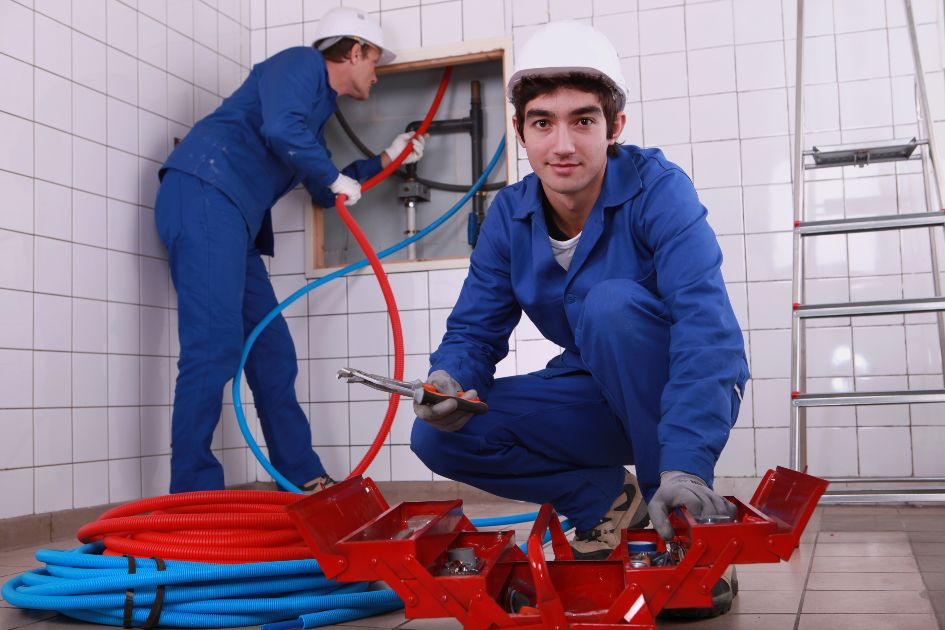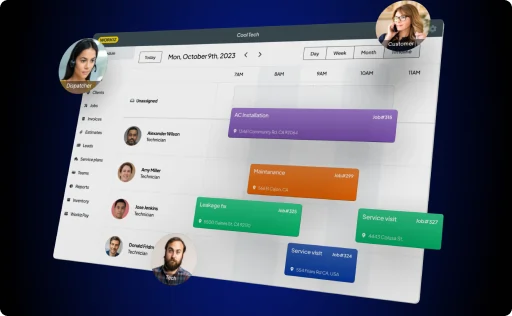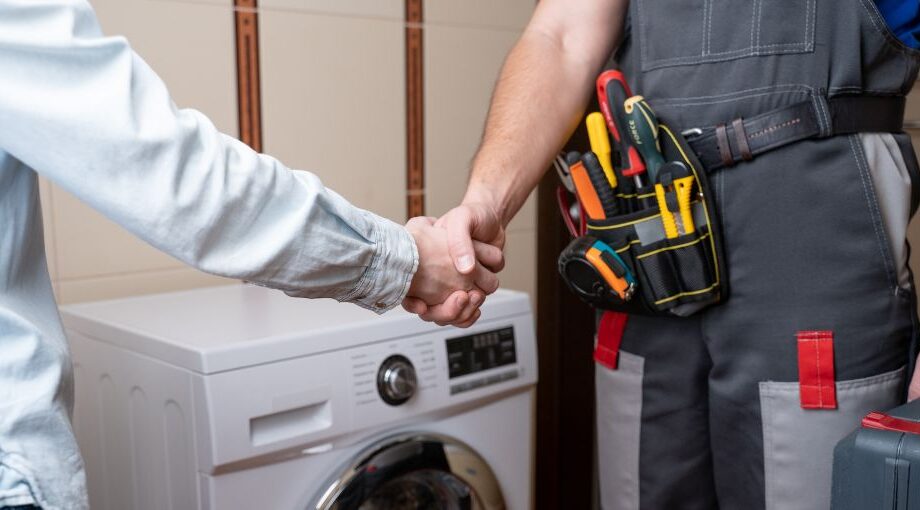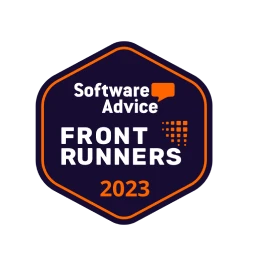Since you’re operating a field service business, where you’re not always around, you’d like an employee who knows his (or her) way around toilets and sinks, but you’d also like someone trustworthy. You want to show up at the job site on time, treat your clients with kindness, and successfully collaborate with other plumbers and dispatchers.
All of these are often hard to predict when you only get a few minutes to speak to a potential hire before a contract is signed. Then again, you don’t want to make a mistake that might cost you client dissatisfaction, not to mention the lost time and compensation. You also don’t want to ask too many questions that might cause your candidates to feel uncomfortable, possibly risking losing them to another business.
The first key to a successful hire is asking the right questions that will help you know the candidate better personally and professionally. In this piece, we’ll tackle the most critical questions you should ask on the professional and personal level, followed by insights to keep in mind, as well as “red flags” that shouldn’t be ignored.

The essential plumber interview questions & answers
Professional questions:
When it comes to plumbing, there are a few key questions you should always ask in an interview in order to gauge a candidate’s qualifications. These questions are especially important if you’re interviewing someone with relatively little experience since you’ll need to know where that person can handle tasks on their own and where they’ll need close supervision at first. Such questions may be:
1. What training or qualifications do you have that make you suited for a plumbing job?
Why ask this?
U.S. Plumbers typically undergo a four-year apprenticeship program to receive hands-on training and education in the trade. During this time, plumbers learn how to install, repair, and maintain plumbing systems. After completing their apprenticeship, plumbers must then pass a state-licensed journeyman or master plumbing exam in order to earn their plumbing license.
All this means is that the trained plumbers you interview shouldn’t have less than five years of experience in the industry. It also means that a plumber who hasn’t completed their exam or got their license is still considered an “apprentice.”
Potential answers:
Any answer given should contain the exact count of qualifications, certifications, or years of experience, verified by names of companies and institutions.
What you’d REALLY like to hear:
Depending on the level of professionalism required by your job description.
2. What is the algorithm for unclogging blocked pipes?
Why ask this?
This is a straightforward question to address the candidate’s skills in the field. Notice not just the solution given but also how they approach the problem in the first place.
Potential answers:
There are a few different ways that plumbers can go about unclogging a pipe, but the most common method is using a plunger:
“First, make sure that there is enough water in the sink to cover the plunger. Next, place the plunger over the drain and push and pull the plunger up and down. Once you’ve done this a few times, try flushing the sink to see if the clog has been removed.”
What you’d REALLY like to hear:
More than one answer to this question.
4. What are some of the most essential plumbing tools?
Why ask this?
Another straightforward question to test the candidate’s professional knowledge. The answer to that question may predict how that plumber will later gear up for the field.
Potential answers:
The most essential plumbing tools are a plunger, a drain snake, and a set of wrenches. Plungers are used to clear clogs, drain snakes are used to remove blockages that are further down the drain, and wrenches are used to turn valves and unscrew fittings.
What you’d REALLY like to hear:
– The interviewee naming at least three essential plumbing tools.
– The interviewee explaining what each tool is used for and in what circumstances.
5. What are some of the most popular types of chemical drain cleaners?
Why ask this?:
Same as the last question, but this time in order to test a deeper knowledge of the industry and tools available.
Potential answers:
Some of the most popular types of chemical drain cleaners are caustic soda, hydrochloric acid, and sodium chemicals.
What you’d REALLY like to hear:
– The interviewee named at least three popular types of chemical drain cleaners.
– The interviewee explained what each cleaner is used for and in what circumstances.
6. What is the algorithm for waterproofing a basement?
Why ask this?
Waterproofing a basement is one of the most essential plumbing services. After all, no one wants their basement to flood!
Potential answers:
The answer to this question will vary depending on the type of waterproofing system being used. However, in general, you’re looking for an answer that includes some sort of drainage system (either an internal or external one) and a waterproof barrier (such as a sealant).
What you’d REALLY like to hear:
An answer that demonstrates not only the candidate’s technical knowledge but also their understanding of how to assess each individual situation and choose the best solution for it.
7. Please explain the process of fixing a leaky water pipe
Why ask this?
You want the candidate to go into detail to make sure that they are self-reliant and don’t require close guidance in the field.
Potential answers:
“First, I would turn off the water to the pipe that is leaking. Next, I would take apart the fittings and pipes until I got to the point of the leak. After that, I would apply a patch or sealant to fix the problem. Finally, I would put everything back together and turn the water back on.”
What you’re REALLY looking for:
An extra service-oriented answer like “I’ll make sure the place looks spotless before calling the client to have a look.”
8. What are your safety-related responsibilities when working as a plumber?
Why ask this?
To ensure that the plumber understands and is able to follow basic safety precautions. Careless plumbers can be a burden for insurance costs, and that’s without mentioning the danger they pose to their own health.
Potential answers:
– “I always make sure to wear the proper safety gear, such as gloves, goggles, and a breathing mask.”
– “I am careful to follow all safety protocols when using potentially dangerous tools and chemicals.”
– “I always make sure to work in a well-ventilated area.”
What you’d REALLY like to hear?
An extra service-oriented or accountable saying like, “And I always make sure my colleagues/ clients do the same.”
8. Have you used any mobile app/plumbing software on the job?
Why ask this?
With the increased use of technology in every industry, it’s important to make sure that your plumbing technicians are comfortable using various mobile apps and software. This not only makes their job easier but also helps you save time and money (ask all plumbing businesses that use Workiz and increase their revenue by 22% on average!).
Potential answers:
An ideal answer will be if the candidate has used a mobile app or software for their plumbing work before. If not, they should at least be familiar with the concept and be willing to learn how to use it. Most millennials shouldn’t have a problem with that concept.
What you’d REALLY like to hear:
An answer that shows that the candidate is open to new technologies and willing to learn how to use them. Experience with Workiz is a huge plus!

Personal questions:
When you don’t want to invade the candidate’s privacy, some questions are essential in order to get a better sense of who they are and whether they’re accountable. This is also a fantastic opportunity to see whether they’re a good fit for your client base. Be attentive to whether they are able to communicate at eye-level with customers in your area and if they keep it together while solving a complicated problem.
1. Why do you want to work in the plumbing industry?
Why ask this?
This question is most relevant to junior plumbers, though experienced plumbers could also be tackled with a question such as “what do you like about the industry.”
Potential answers:
Answers may vary – some obviously have a previous connection to the industry (either by working for another business or having a family member who is a plumber). Others may enjoy working in the field or being relatively close to home, and some simply like helping neighbors in need.
What you’d REALLY like to hear:
The most successful plumbers have a strong interest in the trade and are passionate about helping people solve their plumbing problems. That may be simply because they are good people who work well with others, and these are the exact hires you’d always like to have working by your side.
2. What tips can you recommend to clients in order to avoid plumbing issues?
Why ask this?
A most important question to test the interviewee’s ability to provide excellent customer service. It also allows you to see if they have a proactive approach to problem-solving, as well as the care they show for their clients and their ability to upsell (sell related products to clients).
Potential answers:
Some tips that can be recommended to clients in order to avoid plumbing issues are as follows:
– Use strainers in all drains in order to catch hair and other debris that can cause clogs.
– Inspect plumbing fixtures regularly for leaks and have them repaired as soon as possible.
– Do not pour grease or oil down the drain as this can cause clogs.
– Do not flush anything other than toilet paper down the toilet.
– Avoid using chemical drain cleaners as they can damage the pipes.
What you’d REALLY like to hear:
An answer that demonstrates the candidate’s ability to offer a premium service to the clients (with a premium charge, as demonstrated using a sales proposal) while providing added value to show that they truly care.
3. If a client asks you to fix a clogged pipe issue, what options will you offer?
Why ask this?
Another way to test the candidate’s knowledge. Clogged pipes are the most common fix requested from plumbers, so any pro should have more than one answer to that question.
Potential answers:
The candidate should be able to offer at least two different ways to clear a clogged pipe, such as using a plunger or a drain snake.
– Use a plunger to try and dislodge the blockage
– Use a drain snake to clear the blockage
– Try a chemical drain cleaner
– Remove the blockage manually
What you’d REALLY like to hear:
The candidate emphasizes the importance of answering the client’s inquiry with patience and kindness.
4. Please describe one of the most challenging cases related to your previous plumbing experience.
Why ask this?
You want to know if the candidate has ever faced a difficult situation on the job and how they handled it. This may teach you how they handle stressful situations and harsh feedback.
Potential answers:
The candidate should be able to describe a challenging situation they faced on the job and how they coped with it. For example, they might talk about a time when they had to figure out an innovative solution to a plumbing problem or visit a client’s home several times (which happened to us all).
What you’d REALLY like to hear:
The candidate might not just talk about how they used a new type of pipe or fixture to solve the problem but how they handled the client’s frustration. This shows that the candidate is resourceful, customer-oriented, and can think on their feet.
5. Did you have any difficult situations in the interaction with irritable clients? How did you solve them?
Why ask that?
As mentioned, the ability to handle difficult clients is an important skill for plumbers. After all, not everyone is easy to work with, and sometimes things can get heated (literally and figuratively).
Potential answers:
We all have stories related to clients who have lost their temper, but what you’re most interested in hearing is that the candidate never lost theirs.
What you’d REALLY like to hear:
How a candidate not only reassured the client but somehow managed to turn them into recurring ones.
6. What tools did you use to explain the problem and possible solutions to the customer?
Why ask this?
Candidates who have excellent customer service skills will be able to easily put themselves in the shoes of the customer and understand their needs. They should also be able to use the right mix of technical jargon and layman’s terms to explain the problem and potential solutions.
What you’re REALLY looking for:
The ideal candidate will be able to show that they have excellent communication skills and are able to adapt their language depending on the audience. They should also be able to offer a few different solutions to the problem, showing that they are resourceful and think outside the box.
7. What technical skills a professional plumber should have?
Why ask this?
Most of the time, people who work in the service industry are not required to have any specific technical skills.
Then again, since plumbing is a skilled trade, most employers will want to know that the candidate has at least the basic technical skills required to do the job when accompanied by others.
Some potential answers:
– “I am familiar with the most common types of plumbing systems.”
– “I know how to use all of the standard plumbing tools.”
– “I am familiar with the most common types of plumbing problems and how to fix them.”
What you’d REALLY like to hear?
An extra confident or experienced answer like, “I have experience with __ type of plumbing system/tool/problem, so I know my way around them.”

How to spot red flags
During the interview, the candidate might stutter or throw in some unflattering examples. While these could just be a result of interview-related panic and shouldn’t get the candidate disqualified, having more than two or three of them during the interview could pose a question mark on the candidate’s fit for the team.
What you should be most aware of (in descending order):
- Gaps in professional knowledge (especially when that candidate reports to have significant experience)
- Disrespect or mean comments towards former employers, crew members, or clients
- Lack of accountability (the candidate doesn’t own their mistake or doesn’t look you in the eye)
- Lack of caring for the client’s satisfaction
What to do when spotting one or more red flags?
First of all, confront the candidate. Ask them why they’re saying what they’re saying while truly listening to them, just in case there has been a misunderstanding.
If flags are still raised but that candidate has left an overall good impression, ask to speak to a former boss or a co-worker for reference. When speaking to these, ask the candidate’s acquaintances whether they would work with that person again. Their answer could mean a lot, especially if they don’t sound too confident when answering. Lastly, if the red flags remain, it’s probably best to pass on that candidate.

To conclude
The most important thing to remember when interviewing plumbers is that you want to gauge their level of experience and expertise. While some questions may be general in nature, others will be specific to the trade.
By asking both types of questions, you’ll be able to get a well-rounded picture of the candidate’s skill set. You’ll also want to ask questions that gauge the plumber’s customer service skills. After all, plumbing issues can be stressful for homeowners, so it’s important to hire someone who is patient and understanding.
If you’re using Workiz, you may also prefer someone with experience using field service management software. Then again, considering how easy-to-use Workiz is, that’s no dealbreaker.
Lastly, embrace red flags rather than ignoring them. This could be your chance to avoid a hire that you’ll end up regretting. Remember that no one is perfect, but good employees can always be trained to be even better, especially if they’re willing to learn. Give them the best candidate experience possible to make sure they start working at your business with a smile. Good luck!










